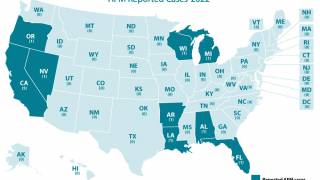With Poliovirus in Wastewater, Should We Get Boosted

In 2022, the detection of poliovirus in wastewater in Jerusalem, London, and New York City are reminders that contracting polio is a risk for everyone when found anywhere.
As of August 12, 2022, analysis from the U.S. CDC confirmed the presence of poliovirus in 20 positive samples that are genetically linked to an individual case of paralytic polio in Rockland County, New York.
Six positive samples of concern have been identified in New York City (NYC).
While these samples have not been genetically linked to the Rockland County polio patient, sequencing analysis characterizes these samples as either a vaccine-derived poliovirus or variants of the revertant polio Sabin type 2 poliovirus.
"For every one case of paralytic polio identified, hundreds more may be undetected," State Health Commissioner Dr. Mary T. Bassett said.
"The detection of poliovirus in wastewater samples in New York City is alarming but not surprising."
Neighborhoods in NYC where coverage of young children with three doses of polio vaccine is about 70% which is putting these children at risk of contracting polio.
But in the Williamsburg section of Brooklyn, the children's vaccination rate is less than 60%.
And recent data indicates poliovirus has been found in northern counties of New York.
Following analysis from the CDC, the polio virus was detected in samples from June in Rockland County.
"Based on what we know about this case, and polio in general, the Department of Health strongly recommends that unvaccinated individuals get vaccinated or boosted with the FDA-approved IPV polio vaccine as soon as possible," State Health Commissioner Dr. Mary T. Bassett said.
"The polio vaccine is safe and effective, protecting against this potentially debilitating disease."
"It has been part of the backbone of required, routine childhood immunizations recommended by health officials and public health agencies nationwide."
As of August 1, 2022, Rockland County has a polio vaccination rate of about 60%.
According to CDC, inactivated poliovirus vaccine (IPV), which is the only polio immunization that has been given in the United States since 2000, protects 99% of children who get all the recommended doses.
The most important way for children and adults to protect themselves from polio is to vaccinate.
Most adults do not need the polio vaccine because they were already vaccinated as children.
Adults at increased risk of contact with poliovirus, such as those living in NYC and who have previously completed the polio vaccination series, can receive a one-lifetime booster dose of IPV, says the CDC.
This CDC guidance means New Yorkers who are not up-to-date with polio vaccination should speak to their healthcare provider.
Polio vaccine booster shots are recommended because 'It is not known how long people who received IPV will be protected against polio,' says the CDC.
In London, children aged 1 to 9 years old are now offered 'a top-up dose' to ensure they have maximum protection from poliovirus.
This extra-precautionary dose is suggested because research indicates antibody tests can detect immunity.
The extensive cross-reactivity among enteroviruses cannot be predicted from phylogenetic analysis.
Polio is a member of the enterovirus genus and a viral disease that can affect the nervous system and cause muscle weakness.
The polio virus typically enters the body through the mouth, usually from hands contaminated with the fecal matter of an infected person.
Respiratory and oral-to-oral transmission through saliva may also occur.
Polio is very contagious, and a person can spread the virus even if they aren't sick. Symptoms, which can be mild and flu-like (fatigue, fever, headache, stiffness, muscle pain, vomiting), can take up to 30 days to appear.
During this time, an infected individual can be shedding viruses to others.
Though rare, some polio cases can result in paralysis or death.
Adults with poliomyelitis may develop noninfectious post-polio syndrome (PPS) up to 40 years later.
PPS is characterized by a slow and irreversible worsening of weakness, often in those muscle groups involved during the initial infection.
And since 2012, the USA has reported a distinct syndrome of acute flaccid paralysis (AFP) with anterior myelitis, predominantly in children.
It's essential that healthcare professionals rule out poliovirus infection in cases of unexplained AFP that are clinically compatible with polio, particularly those with anterior myelitis, says the CDC.
The good news is polio vaccines are readily available in the USA, as most clinics and pharmacies offer individual or combination vaccines.
PrecisionVaccinations publishes fact-checked, research-based vaccine news manually curated for mobile readership.
Our Trust Standards: Medical Advisory Committee























